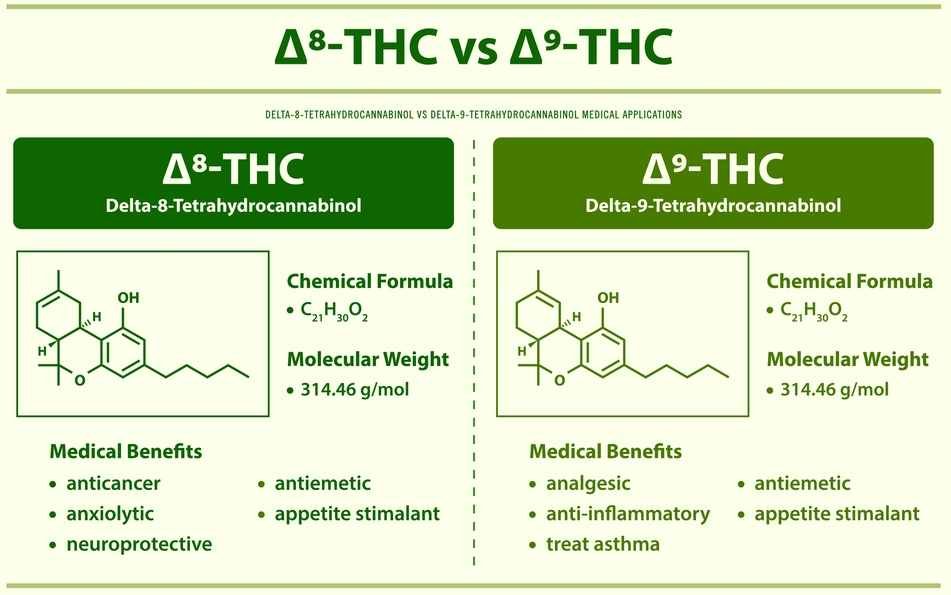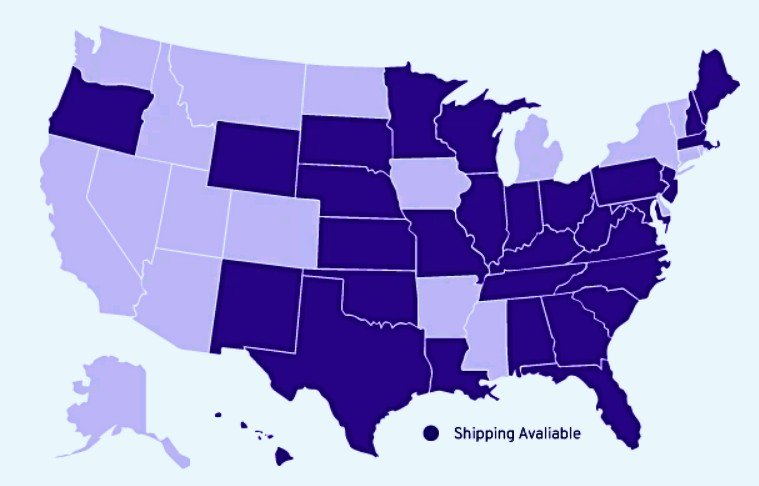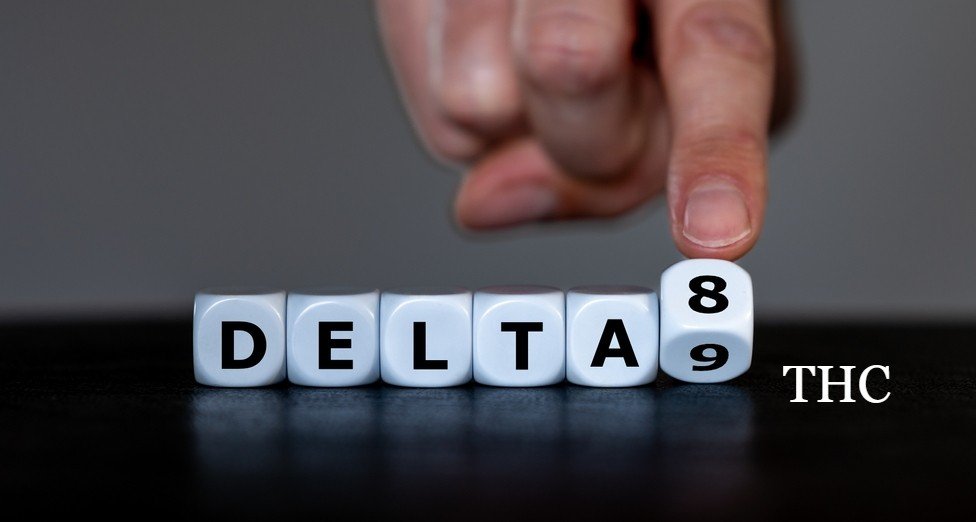Delta 8 THC and delta 9 THC are among the most commonly discussed and widely used cannabinoids found in cannabis and hemp plants. Both are isomers and are considered to be tetrahydrocannabinols (THCs). They are known for both their psychoactive and therapeutic effects.
However, there are certain differences between the two THCs, and many people wonder which is the better one.
In this article, we will take a detailed look at the differences and similarities between delta 8 and delta 9 THC, and explore their effects, legality, dosage, safety, and affordability to figure out which one is a better choice for you.

Delta 8 vs Delta 9: Similarities
There are many similarities between delta 8 and delta 9, such as:
- Both tetrahydrocannabinol (THCs) are found in the cannabis and hemp plant.
- They both have a similar chemical formula although the chemical structure is different by a bit.
- Both compounds interact with the body’s endocannabinoid system in a similar way and produce similar psychoactive effects such as euphoria, relaxation, and increased appetite.
- Both delta 8 THC and delta 9 THC can be consumed in similar ways and there are many different varieties of products available for both the THCs, like edibles, vapes, flowers, and oils.
- Both the THCs also exhibit similar therapeutic benefits, such as anti-inflammatory, analgesic, and anti-anxiety properties.
- Both the THCs if taken in huge quantities can cause similar side effects such as dry mouth, dry eyes, dizziness, and anxiety.
Delta 8 vs Delta 9: Differences
Delta 8 and delta 9 THC are similar cannabinoids, but there are some key differences between the two compounds:
- The psychoactive effects aka “high” of both delta 8 and delta 9 THC are different. delta 8’s effects are milder and more subtle, while delta 9 produces a more intense and euphoric high.
- While both the THCs have a similar chemical formula, their chemical structure is different which produces the difference between the two compounds.
- Delta 8 THC is also considered to be less potent than delta 9 THC, which means that you will need a higher dosage of delta 8 to achieve the same effects as delta-9.
- Delta 8 THC products tend to be more expensive than delta 9 THC products because the commercial delta 8 is synthetically produced, while delta 9 remains a naturally produced cannabinoid. However, the prices greatly depend on the brands.
Delta 8 vs Delta 9: Legality in the US
The legality of delta 8 THC and delta 9 THC in the US is a complex issue. While both THCs can be extracted from cannabis and hemp plants, according to federal law, cannabis or THCs derived from cannabis are classified as Schedule I restricted substances, making them unlawful to possess, consume, or distribute. But some states have legalized cannabis and the THC that is produced from it.
However, the 2018 Farm Bill has allowed hemp-derived delta-8 and delta-9 THCs, making them federally legal in the US, but many states have different laws on both THCs.
It is legal to possess, use, and distribute hemp-derived delta-8 THC in states that have legalized hemp and hemp-derived products. However, the commercial delta-8 THC is artificially made from CBD, so some states have enacted laws that either ban or restrict the sale of this synthetic cannabinoid. It’s important to check the laws in your state before buying or using delta 8 THC.

On the other hand, hemp-extracted delta-9 THC is a natural cannabinoid, so currently it has no restriction in any state, making it the only legal THC in all 50 states of the US.
Even if you live in a state where cannabis and delta 8 THC are illegal, you can still legally purchase hemp-derived delta 9 THC products online and get them delivered to your doorsteps.
Delta 8 vs Delta 9: Comparison of effects
Both delta 8 THC and delta 9 THC have similar effects (in other words, “high”), but there are some differences in the intensity and duration of these effects.
Delta 8 is known to produce a milder and more subtle high, and the effects take longer to feel. On the other hand, delta 9 takes less time to kick in, while its effects are comparatively stronger, euphoric, and more intense.
To put it more simply, delta-9 THC is twice as strong as delta-8 THC.
Additionally, there is less chance to have a bad experience even if you take a higher dosage of delta-8, while a higher dosage of delta-9 can cause discomfort in the form of anxiety, paranoia, impaired senses, and hallucinations.
Delta 8 vs Delta 9: Comparison of the extraction process
The extraction process for both THCs is quite different.
Delta-9 THC is typically found in higher concentrations in the cannabis and hemp plants, making it easier to extract and infuse.
The most common method of extracting delta-9 THC is through the use of solvents such as ethanol or CO2. This process involves dissolving the plant material in the solvent to extract the THC, and then the solvent is evaporated, leaving behind a concentrated THC extract.
On the other hand, delta 8 is found in lower concentrations, so it requires a lot more processing and effort to extract.
Due to the limited natural availability of delta 8 THC, many brands use artificial processes to create it in the lab. The process usually involves using solvents such as ethanol or CO2 to extract the delta 8 THC from the hemp-derived CBD, followed by distillation, winterization, and decarboxylation to purify the extract.
Delta 8 vs Delta 9: Comparison of dosage
Depending on the person and how a THC product is used, different THCs have different recommended dosages. For example, both delta 8 and delta 9 THC can be consumed in a variety of ways, such as, it can be smoked, vaped, or consumed in edible forms.
For each form of consumption, the effects and dosage vary greatly. For example, smoking or vaporizing delta 8 THC or delta 9 THC will produce more immediate and intense effects, but it’s difficult to pinpoint the exact dosage. While consuming the THCs in edible forms will take longer to produce a high and it will last for a long time.
Nevertheless, while using any of the THCs, it is recommended that you start with a low dosage, say 5 mg for delta-9 THC and 10 mg for delta-8 THC, and gradually increase the dosage if you feel the need.
For most people, the average dosage for delta 8 THC lies between 5 mg and 60 mg, while the average dosage of delta 9 THC is between 2 mg and 40 mg.
Delta 8 vs Delta 9: Comparison of safety
If used responsibly, both delta 8 and delta 9 THC have strong safety profiles.
However, with any psychoactive substance there are is a chance of potential dangers and adverse effects that may come with using it. For example, if you use delta-9 THC in higher dosages, you can experience dry mouth, dry eyes, dizziness, paranoia, and anxiety. While a higher dose of delta-8 THC will only cause dry mouth and dry eyes.
Additionally, THCs can also affect cognitive and motor function; therefore, it’s important to remember not to operate heavy machinery or drive a vehicle while stoned.
Delta 8 vs Delta 9: Which will show up on a drug test?
A cannabis drug test screening is designed to detect THC in your system, so both delta 8 THC and delta 9 THC can be detected on drug tests.
If your work requires you to periodically take a drug test, then it’s best to avoid any kind of THC because no matter what kind of THC product you are using, it will most likely show up in a drug test.
In this case, you can try non-psychoactive cannabinoids like broad-spectrum CBD or CBD isolate because they will not show up in any kind of drug test.
Delta 8 vs Delta 9: Which one is better?
Delta-8 and delta-9 are both widely utilized and popular tetrahydrocannabinols (THCs) in the US, but which one is better for you largely depends on your use case.
For instance, if you have a busy schedule and want to use THC to manage difficulties like insomnia, pain, stress, or anxiety, delta-8 THC will be a better option because it works well in variety of conditions while having much milder and more tolerable effects.
On the other hand, if you are looking into THC for its psychoactive effects, you need a stronger cannabinoid like delta-9 because, while it also offers many therapeutic benefits like its sibling but delta 9’s high is much more intense and euphoric.
That being said, the law of your state also plays a role in this because if you live in a state where synthetic cannabinoids like delta-8 are illegal, then hemp-extracted delta-9 THC is your only option.
Final thoughts
There you have it, a detailed comparison between the two most famous THCs.
To sum it up, delta 8 THC and delta 9 THC are two of the most widely discussed and studied compounds found in cannabis and hemp plants. Both are tetrahydrocannabinols (THCs), which are known for their psychoactive and therapeutic properties.
While both compounds have similar effects, delta-8 is known to produce a milder and more subtle high compared to delta-9.
Additionally, delta 8 THC derived from hemp is now allowed in the US according to the 2018 farm bill, though there are certain state-specific restrictions because it’s a synthetic THC, whereas delta 9 THC which is naturally derived from hemp and contains less than 0.3% of THC is currently permitted in all 50 U.S. states.
That being said, take necessary precautions while shopping for any cannabinoid products, and don’t forget to check the COA before shopping.
Disclosure:
The information in this article is intended for general use only and may not always be appropriate for everyone’s needs. Your health and wellness are unique to you, so before acting on anything we say, seek personalized advice from a medical professional.
We value the accuracy and editorial integrity of all our articles, and we strive to ensure that the content we publish is accurate and up-to-date to the best of our knowledge.

